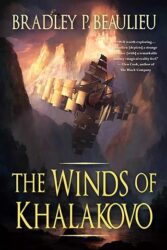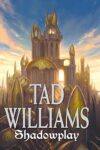Book News this week: The guys talk a little more about an article that goes deeper into the numbers from the AAP report on ebooks outselling paperbacks, and elaborate a little more on the challenges of auditing ebook sales.
Mike Stackpole has a series of articles on digital publishing and self-publishing over on his website.
 Interview: This week, Mike and Mike chat with Brad Beaulieu about his new novel, The Winds of Khalakovo, an epic fantasy series from Night Shade Books in the same vein as George R. R. Martin’s “A Song of Ice and Fire”.
Interview: This week, Mike and Mike chat with Brad Beaulieu about his new novel, The Winds of Khalakovo, an epic fantasy series from Night Shade Books in the same vein as George R. R. Martin’s “A Song of Ice and Fire”.
Keep an eye out for the sequel, The Straits of Galahesh, in April 2012.
MRM: And welcome back to more Dragon Page Cover to Cover! I’m Michael R. Mennenga…
MS: And I’m Michael Stackpole, and with this we have Bradley Beaulieu with whose new book “The Winds of Khalakovo” is from Night Shade Books.
MRM: How you doing Brad?
Brad: Doing great, thanks for having me.
MRM: Not a problem. So tell us about this book, because it sounds interesting, and we love the fact that it’s on Night Shade and you’re doing all kinds of really cool stuff with it.
Brad: Yeah, the epic fantasy for people that know fantasy, I kind of compare it to George Martin
“Song of Ice and Fire” and kind of merged a little bit with “Earthsea”. But I don’t pull the writing style so much from Le Guin and I definitely more of the George Martin camp when it comes to the writing style.
And so it’s an epic fantasy set on a world of disparate islands. It’s a very cold and harsh place to live. It draws a lot from Russian influence, mostly from Muscovite Russia. Also it has some Persian influence running it through it as well. The story itself focuses on the grand duchy, which is kind of modeled loosely after the Grand Duchy of Muscovite Russia. It focuses on the blight that’s sweeping through the islands. The blight has many different effects… it’s causing game to be scarce, the fields to go fallow and it also causes a wasting disease among the people.
It’s been happening for a number of years, and when the story opens, we are introduced fairly quickly to one of the three main characters: Nikandr, who is a prince of one of the Duchies. And he, along the course of the story, stumbles across a boy who has the power to either heal the blight that’s happening on the islands or rip it wide open. And so he becomes kind of the fulcrum around which the story revolves.
And there’s another group of people called the Aramahn who are the indigenous folk of the islands. And when the royalty of the Grand Duchies moved in and sort of pushed the indigenous peoples out, they’re a peace-loving people.
So by and large, they didn’t like it, but accepted it. But over time, the practices of the landed people of the Duchies became a little bit too harsh and so a splinter group formed which is you know kind of analogous to some of the religious extremism that we see today in our own world.
And so so those people are trying to use this boy to push the Grand Duchy you know back from once they came so to speak, whereas the prince Nikandr is trying to find this find his way to the boy who was more like a savant he doesn’t really interact with the world like most of us do. So he’s hard to reach. He’s extremely powerful, but he doesn’t even realize that. So a lot of the stories kind of a struggle between the Prince and this pointer group to control this boy, learn about him and find how he can do what he can do.
MRM: I’m actually looking at the cover of your book right now and you’ve got this gigantic, awesome flying, very steam-punky ship on there with gigantic sails and so forth. Is that indicative of something in the book or that just creative license from the artist?
Brad: Yeah, actually I was really, really pleased with how the wind ship came out. The cover artist is Adam Paquette. He’s done a number of things for Wizards of the Coast and some other folks. But I hadn’t heard much about him, but it was just stellar what he came up with. And I really like all the Russian influence on the cover as well.
But the, yeah, the wind ship is directly out of the pages. It’s, it’s almost like fully formed from my mind to the page. It was pretty incredible what he did. So the, yeah, the wind ships figure in pretty prominently throughout the duchys, each duchys… there’s nine duchys in the Grand Duchy and they’re separated by fairly large stretches of water.
And as I mentioned, a very inhospitable world and waterborne travel was not feasible. The archipelago is that the Duchies, the islands, sit upon, they can travel easily between them, but not between the Dutchies themselves. The water just is just too treacherous. And so they turn to wind magic and the nature of the wood to be able to travel. So it’s actually the wind ships have become the mode of commerce and travel and in some ways communication between the islands. So it’s how the wind ships are a huge part of the story.
MS: Now when you were looking and developing the story, you know, having read in the book, you did get the sense that there were… it did seem very much the Russia versus Islam in Central Asia, you get sort of that sense of that tension. Was that a starting point for you or as you were writing the book, did you find that sort of creeping in as an influence and it just seemed to naturally flow?
Brad: Yeah, it wasn’t a starting point. I think the starting point was really the boy Nasim and having this savant with these great powers…. that was one of the earliest kernels that I had. And at that point, I hadn’t really understood what the cultural influences were. And I came up with the Persian — sorry, the Russian influence first. And the Persian influence is largely from their mode of dress, some of their customs, but their religious outlook is actually closer to Buddhism.
And that wasn’t terribly conscious either, but the extremism kind of came in, as you say crept in along the way. I’ve been following politics and name a person in the US that hasn’t been affected by the Gulf War and some of those things. And so that just naturally crept in and when it did, I was fairly conscious of it happening. But I did like it.
It was one of the things that I wanted to explore in the book, what does religious extremism mean? In some ways it feels like those religious beliefs and practices are almost hijacked by certain people, right? And that’s just one of the things that I wanted to see, you know, what would happen on this particular world with these particular people, you know, with those kinds of circumstances?
MS: I think that’s something that a lot of writers do and I think a lot of readers don’t understand it, that there are times that you ask a “what if” question and you kind of work the problem out as you’re writing without ever having an answer, and you reach answers you’re writing.
Were there things that you were doing in this book that it surprised you, the where it ended up, that you wouldn’t have thought it would have?
Brad: Well, I think that’s one of them. As I mentioned, the Buddhism thing, the Aramahn, or the people that are kind of peace loving, and the splinter group are called the Maharraht. And I didn’t really plan for anyone to be very violent in the beginning because they are very peace-loving in fact. And so it was actually one of the things I had trouble reconciling.
I was actually talking with Jim Kelly — I do a podcast as well — and he was talking about you stumble across things as you’re writing. You find these things that are just cool, they’re too cool to pass up. So you kind of work them into the story and then later on you try to justify them. And sometimes they work and sometimes they don’t. But this was one of the things that did end up working.
I liked the first of all the contrast between these peaceful people that preach “do no harm to others”. And yet there’s another group of people that came from those teachings that are willing to stop at nothing to try to get their land back essentially, and their way of life back. And they do believe in reincarnation. And so one of the things that they’re trying to do is to achieve sort of a state of oneness over the course of many lives, thousands of lives.
And the people that have, the Maharraht who have decided to go the way of violence realize that they’re setting themselves back in their eyes on their way to Nirvana, so to speak. But they justify it in thinking that they’re doing it for the rest of their people. So they’re giving of themselves. So they’re not actually looking at it like their committing violence so much as they are healing their people over the long run kind of thing.
So yeah, I think that was actually one of the biggest things that surprised me and I liked and kept over the course of the story.
MRM: You were alluding to having Martin’s pacing and his style, so to speak. I mean, it sounds like that you’ve kind of dove into the political aspect of this world, but I mean, how much parallel did you draw?
I mean, is there a lot of things in there that you kind of disguised as things that are in current events, or influenced from current events? I always like to ask that because, you know, it’s hard not to bring that stuff in when you’re an author.
Brad: Yeah, it definitely is. I’m fairly conscious of, I don’t like having direct parallels. It kind of creeps me a little bit as a writer. I don’t want that kind of thing. And that’s largely why I don’t write
and kind of current times that and not being a very good student of history, frankly. [laughter]
So I like making up my own stuff as I go along. But so that’s the current events. You can see some of them in here.
I would say that they’re imperfect reflections of what’s happening in the world and what has been happening.
I like to think, and it’s a common refrain. We are children of our time. We can’t escape those things. They will show up in our writing no matter what we do. And I don’t mind it. As long as I feel like I’m bringing something fresh to it, as long as I feel like I’m putting my own slant on those things… so I guess what I pull from that stuff mostly is kind of the emotions and the cultural flare points as well just to help create, not just to create tension, but to create a realistic form of tension. And one that really resonates with people, because that’s the stuff that I really dig, when things come to a head in the story, I feel them, I feel them in my gut, and in some places they were you know they’re kind of difficult to to write you know and that’s that’s when the good stuff comes out.
MS: I agree, and I think this is a great book. I want to shift gears for half a second. I first met you I think it was at GenCon.
Brad: Yeah I think so.
MS: When when you were attending a lot of the writer’s symposium stuff which Jean Rabe has gotten there. Since we’ve got a lot of listeners who would like to writa and I think you don’t find local classes and local teachers sort of directly on point for what they want… can you talk a little bit about what your experience was in attending those classes at GenCon, or at conventions, and what you kind of get out of that?
Brad: Yeah, so I’ve been going to GenCon forever because it used to be in Wisconsin and started out in Lake Geneva and then I grew up near Parkside University and Kenosha, and it was actually walking distance from me there. So that’s actually where I first got exposed to it and then it moved up to Milwaukee, and then finally where it is now in Indianapolis.
And I had been living out in California in the late 1990s. And I had started to… I’ve been working on writing a bit, and the writing wasn’t really going anywhere very quickly and it was because I wasn’t really taking it very seriously. And I was, you know, I figured I better start moving or stop doing it, because it was kind of taking up enough time that I wanted it to go somewhere.
So I kind of dedicated myself and I had been going to GenCon. And at that time, I don’t remember if… I think Jean was involved at the time. Jean Rabe was doing some of the writer’s symposium panels and such. And Kij Johnson was there as well. I don’t know, were you there consecutively with Kij?
MS: I was there before her.
Brad: Yeah, okay, okay. So some of my friends knew Kij and I just started going and seeing her for a few years and then it moved to Indianapolis and then I started going to some of yours, Mike, and then some of the others as well. And then I, I got to know Jean and started to participate, but, before that point when I was in my, you know, kind of learning mode, my apprenticeship… it was a lot of the topics are like one hour each and anybody who’s gone to any of these things will tell you that you can’t go into a great amount of depth, but you can cover things far enough that it gives people some pointers you get some direction and it gives you enough that you can start to dig into those things more fully.
You’ll hear about other places to go maybe workshops, or reading… you’ll hear about a lot of good books out there, so that’s what I did. I used GenCon actually as kind of my before I started going to more conventions as sort of the place that I refilled the well, so to speak. And got sort of a breadth of knowledge on different topics. And then went back and that always charged me so I would go and read more.
I participated in a lot of online critiques of books. I started off with Critters and moved on to the Del Rey writing workshop, which eventually became the online writing workshop, and that was really helpful. And then eventually, I got to know Jean Rabe and John Helfer’s and Kerrie Hughes. And they were all kind of the gang that was helping to organize a bit… Jean mostly, of course, but yeah, I started to participate.
And that’s been a really good too. Eventually, you have to move beyond the learning phase and go to the teaching phase, because when you’re teaching you start to learn. You start to learn things that you wouldn’t have picked up or it made of taking you a long time to pick up if you hadn’t done it, it really crystallizes some of the things that you learn because you’re trying to crystallize those things in your own mind so you can tell other people about it.
So that’s kind of where I am now. I’ve started to go to not just GenCon, but GenCon of is where I do most of the most number of panels and on the widest variety of topics. So that’s been great and they’re kind of random, a little bit random. Obviously we pick the topic ahead of time, but they cover a wide breadth of writing and so it’s really neat to not just go and talk to folks and pass along some of the things that you learned.
But invariably you’ll hear some of the other panelists that either, maybe they echo something you say or say something that goes directly against what you said, and so you learn from it. So it’s a continual process of learning. This is one of the things that I really like about writing in general is that it’s something that hopefully doesn’t end. I think if you stop learning or feel that you stop learning, you’re starting to die as a writer.
MRM: I agree with that. And I tell you, we’re completely running out of time here, but very quickly before we have to go, I wanted to give you an opportunity to talk a little bit about what’s coming up next for you, and what else are we going to see from you?
Brad: Yeah, so the next… I’m under contract now. So I have the first book, The Winds of Khalakovo out from Night Shade books, so it’s out now, just came out April 1st. So I’m under contract for two more books and I’m just the manuscript is due the end of this month. So I’m writing furiously on The Straights of- Galahesh, which is the second book in the series.
And then as that’s been finishing up, Book Three is kind of starting to crystallize. So hopefully it kind of launches me into the next book, and I don’t have to work as much getting it going. So those are the next big things for me that I’ll be out April of next year, the second book, and then the following year, the third book.
MS: Cool.
MRM: Excellent, excellent. Well, thank you so much for being on the show and taking some time for us today.
Brad: Yeah, great. Thanks for having me out. It was really fun.
MRM: Not a problem. We’re completely out of time, so I’m gonna wrap this thing up and say we are done for this week. Thanks everyone for tuning in!
Link: Bradley P. Beaulieu
Link: Night Shade Books
Listener comments: If you have any suggestions or comments, please let us know!
Dragon Page Social Community:
Twitter: @dragonpage
Second Life: slurl.com/secondlife/Wind%20River%20Territory/50/129/22
Promo: Carina Press
Promo: Dragon’s Fire, Wizard’s Flame by Michael R. Mennenga





While listening to another book podcast (Books on the Nightstand) -sorry guys. They mentioned the ABA The Indie Sci-Fi & Fantasy Bestseller List http://news.bookweb.org/news/indie-sci-fi-fantasy-bestseller-list-6 what’s interesting about this list is the number of older classics that appear on the list. I’d be interested in what others think of the list.
Hmm.
Most of three weeks now without an episode; what’s up?
The RL issues that M.M. often mentions?
Or did New Mexico finally get so hot that the Farpoint Studio’s shields failed and it instantly vaporized?
Is the DragonPage ending? I heard from SliceofSciFi that it was going on hiatus, but it did say for how long or why. Please let interested listeners know the duration of this hiatus.